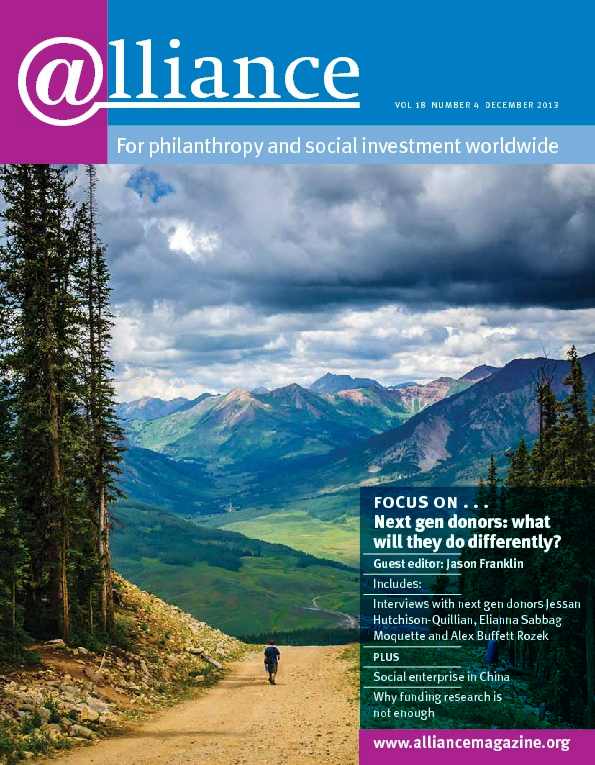Though Brazil’s rapid economic rise has made it the sixth largest economy by nominal GDP in the world, it is not a generous country in terms of philanthropy. What can we expect from the next generation of a country that has seen its affluence and its expectations increase so spectacularly? One clear trend is a preference on the part of the younger generation of donors to want to do things in a more integrated way, achieving social impact through their businesses rather than through philanthropy.
Brazil is not a philanthropic country. A 2010 study by Child Fund Brasil and R Garber found that only 9 per cent of the population donated money. In 2011, a Charities Aid Foundation survey ranked Brazil 85th out of 153 countries in terms of individual donations. Some of this goes to the church or to causes related to religion. Few individuals donate to civil society organizations, most of whose funding comes from social investments by corporations or government partnerships in projects. Most wealthy families organize their social investment using corporate foundations, partly because it offers greater tax incentives than individual donations, partly because corporate social responsibility is favourably viewed.
However, there is no guarantee that the next generation will do the same. Often, they are not involved either with the family business or with the associated corporate foundation. The younger generation seem to want to do things in a more integrated way, through social businesses. Usually they are entrepreneurial by nature and social good plays an important role in their ventures. Impact investing (from the investor’s perspective) and social business entrepreneurship (from the entrepreneur’s perspective) are the buzzwords. A new way of doing business that involves not only creating but sharing value is almost a requirement among the new generation of wealthy individuals. Michael Porter and Mark Kramer’s ‘Creating Shared Value’[1] is often mentioned as first reading.
‘Through impact investing we can provoke a change of paradigms,’ says Antonio Moraes of VOX Capital. ‘The more I improve people’s lives, the higher is my financial benefit (win-win). In a final stage this ideally leads to a new and more egalitarian capitalist system.’
From my experience of working with young donors through Instituto Geração, it seems that the new generation wants to change the world but in a different way. They want to work in a collaborative way and have fun; they want to be entrepreneurs, without bosses or time sheets. They want to create something that fulfils them and brings meaning to their lives. The main areas of interest are housing, education, health and clean energy. Education in particular has caught the eye of the computer savvy and ranks among the favourite in discussions since it is likely to involve increasing use of technology, tapping the potential of online open courses and the ability to reach thousands at once.
Wealthy families, new or old, are in a position to fund these new ventures. In fact, it is usually high net worth individuals and wealthy families who are the early starters in alternative investments. Take the example of IT3Capital, a third-generation family fund that not only invests in social business companies directly but also in accelerators like Artemísia that support entrepreneurs by providing business education. ‘We as investors must be open to ideas and therefore stimulate innovation that can be used to improve the lives of many,’ says Luiza Nascimento.
If you think of philanthropy as the donation of funds, it would be naive to expect a major cultural change in Brazil in the next generation. However, what does seem to be under way is a change in mindset towards creating and sharing value through business rather than philanthropy. This is a conscious part of the business strategy. It goes beyond reducing negative impact and accruing social value incidentally through the activities of the business. In this way, funding that goes into the business and aims at social good will be seen as an investment, not as a cost.
Elaine Smith is director of Instituto Geração and a Young Global Leader from the World Economic Forum. Email elaine@institutogeracao.org.br
For more information
http://www.institutogeracao.org.br
Footnotes
- ^ http://hbr.org/2011/01/the-big-idea-creating-shared-value


Comments (0)